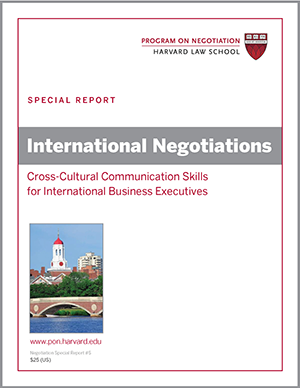
Insights about negotiation strategy from the world of diplomacy
Diplomacy in international negotiations often involves handling difficult people and problems with a more delicate touch than some negotiators would normally employ as part of their normal negotiation strategy. In 2014, many observers viewed Russian president Vladimir Putin’s decision to send Russian troops into Crimea in the wake of violence between protesters and police in Kiev and Ukrainian president Viktor Yanukovich’s abrupt departure as the first gambit in a carefully reasoned strategy – whether in gaining the advantage over the European Union in diplomatic negotiations concerning EU expansion or Russia’s increasing importance as a supplier for Europe’s energy needs.
“Putin is playing chess and I think we are playing marbles, and I don’t think it’s even close,” said Representative Mike Rogers, chairman of the House Intelligence Committee, in criticism of President Barack Obama and his administration. Arguing that Putin’s advance into Ukraine is part of a plan to strengthen Russia’s “buffer zones,” Rogers accused the Obama administration for making too many concessions to Russia and failing to respond decisively to the crisis
Putin’s Diplomatic Skills and Negotiation Techniques Mirror Chess?
Numerous other analysts and policymakers have seized on Russia’s traditional dominance in the game of chess as an apt metaphor for Putin’s advance into Ukraine. Yet others believe the presumption that the West is an unwitting pawn in Putin’s game is unwarranted.
“I would be warning against using a chess analogy because in chess we have rules,” Soviet chess master Garry Kasparov said on CNN’s “The Lead,” “and clearly Putin doesn’t care about rules because what he’s been doing now in Ukraine, it violates international law and international treaties Russia has signed before.”
Dominic Tierney, a correspondent for The Atlantic, compared Russia’s move into Crimea to the Soviet Union’s 1979 invasion of Afghanistan, which later was revealed to have been wholly improvised rather than carefully calculated. If Putin had been planning to take over Crimea, Tierney notes, then why would he have spent $50 billion to burnish Russia’s global image with the Winter Olympics in Sochi?
“Any public relations gains just went up in smoke,” writes Tierney.
We may be tempted to view Putin as a master strategist due to a phenomenon that psychologists dub the fundamental attribution error—the tendency to view our own behavior as driven by external factors (such as the weather, others’ actions, bad luck, etc.) while attributing other people’s behavior to internal factors, namely their character and disposition.
“When the United States acts, we’re responding to events,” writes Tierney. “When Putin acts, he’s following his twisted nature and a clear agenda.”
Negotiation and Improv at the Bargaining Table
What if Putin is just making it up as he goes along? In negotiation and other strategic decision-making contests, the ability to improvise effectively is a critical skill. In his book The Art of Negotiation: How to Improvise Agreement in a Chaotic World (Simon & Schuster, 2013), Harvard Business School professor Michael Wheeler argues that the best negotiators learn to thrive in the midst of chaos and uncertainty and, when necessary, jettison their best-laid plans.
Yet Wheeler noted that these same negotiators also recognize the importance of preparing thoroughly for negotiation by analyzing their BATNA (best alternative to a negotiated agreement), walk-away point, aspirations, and their counterparts’ perspective and likely behavior.
Negotiation Skills and Negotiation Techniques – Expert Negotiators Plan for the Future
In his book The Power of Noticing: What the Best Leaders See (Simon & Schuster, 2014), Harvard Business School professor Max H. Bazerman describes the experience of teaching an executive class with unexpected assistance from several high-level diplomats. Bazerman was struck by the diplomats’ ability to think several steps ahead when analyzing complex international negotiations.
“Consistently the executives and I were thinking one step ahead of the problem at hand,” Bazerman writes. “Meanwhile the diplomats were thinking three or four steps ahead and…developing interesting and important insights. They tended to think intuitively about how the results of negotiations with one country would affect the decisions and behavior of neighboring countries.”
All of us have the capacity to learn to think multiple steps ahead in negotiation, as many diplomats do intuitively, according to Bazerman. The key is to broaden our focus, looking beyond the specifics of the situation at hand.
Related International Negotiation Article: Top Negotiation Case Studies in International Negotiations from Business and Global Politics
Originally published on March 2014.





From what Shonk (2014) is describing seems to be a holistic process, gathering information from all angles and using ones intuition to enhance strategy.